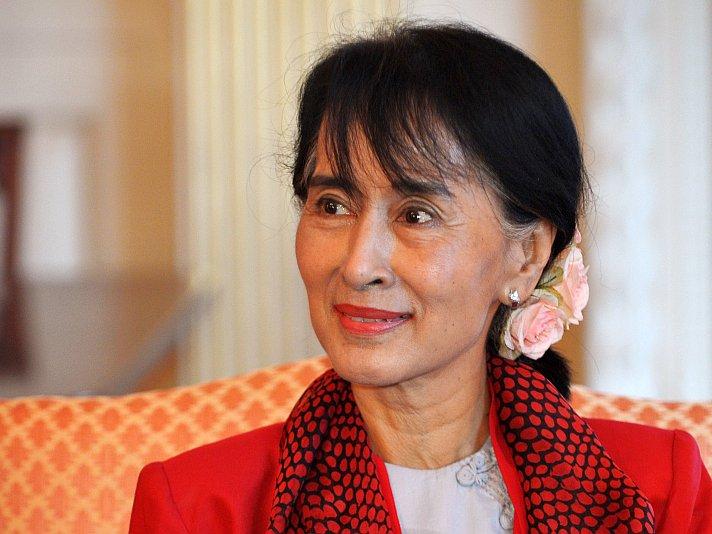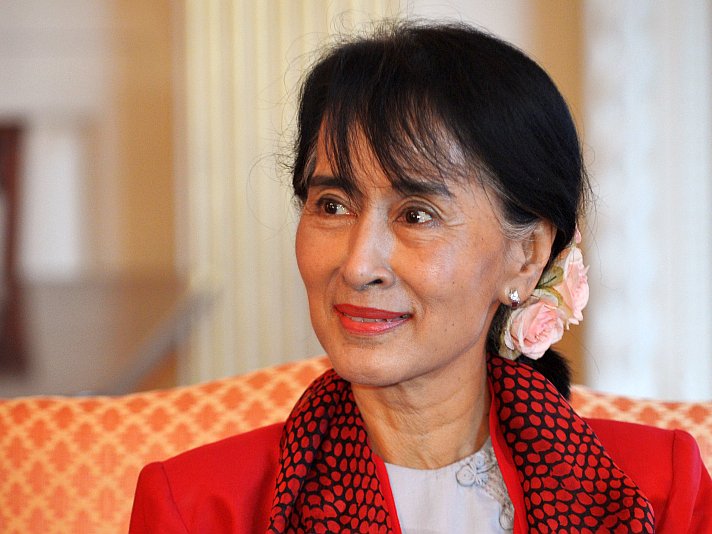WASHINGTON—Aung San Suu Kyi laid out her vision for Burma’s path to democracy in Washington, D.C., Tuesday, calling on the United States, not for aid, but to help the Burmese people shape their own democracy.
“We would like the U.S.–Burma bilateral relationship to be founded firmly on the recognition of the need of our own people to be accountable for their own destiny,” Suu Kyi told U.S. officials, supporters, and the media in an address at the U.S. Institute of Peace.
It was Suu Kyi’s first public appearance on an 18-day tour of the United States and her first trip to America in 40 years.
A Nobel Peace Prize recipient, Suu Kyi, 67, spent the best part of two decades in detention, battling brutal repression under military rule. She was released in 2010 and stood for election in 2011, winning a seat in the Burmese government.
She called on the United States to ease sanctions against Burma (also known as Myanmar), which were imposed on account of the brutality of the military regime.
While the country’s military leaders had formerly denied the effects of sanctions, they had more recently blamed the sanctions for the country’s dire economic state.
“I do not think that we need to cling on to sanctions unnecessarily because I want our people to be responsible for their own destiny and not to depend too much on external props,” she said, again reinforcing the need for the Burmese people to explore and shape their own future.
Burma, rich in resources and with a population of around 60 million, is considered among the poorest and least developed countries in the world.
Acknowledging the changing geopolitical environment in the region, and being mindful of Burma’s strategic position in sharing borders with both India and China, Suu Kyi downplayed political aspects of U.S. support.
“We need the kind of help given that has been given to us by the United States historically, in the fields of education, health, and in the fields of humanitarian aid,” she said, while recalling post–colonial days in Burma.
The U.S–Burmese relationship is not an effort to “contain” China, she noted, but an effort to build good relations with all the players in the region.
She went on to thank the United States for its support over the years.
“The United States is committed to democratic values and proved to be a good friend to all of us who struggled for democracy,” she said.
Challenges Ahead
Suu Kyi visited the United States as leader of the largest opposition party, the National League for Democracy (NLD), in the Burmese government.
After half a century of repressive, military rule, democracy, she said, is a term many Burmese are unclear about when asked what they expect from her party.
“Many of them said, ‘We really don’t know what democracy is, but we don’t want dictatorship,’” Suu Kyi said, adding that most say they want to be free to make decisions for themselves.
Suu Kyi said that there are many challenges ahead for Burma, including establishing rule of law and respect for human rights.
The release of political prisoners is critical, she said, noting the release this week of 500 prisoners, of which 80 were estimated to be political detainees.
There were still many more, 200 by her count, in addition to prisoners of conscience, she said.
A lack of trust between the military and ethnic minorities is not easily resolved and neither are ethnic tensions.
She blamed the recent outbreak of communal violence in Burma’s Rakhine State between the Rohingya Muslims and Buddhists on a failure of rule of law to address the issue in the first place.
“Human rights and rule of law cannot be ignored to solve these problems,” she said.
Suu Kyi referred to the three pillars of democracy, “the executive, the legislators, and the judiciary,” and noted that in Burma, the judiciary is practically nonexistent.
Without these basic institutions, there will be “no freedom for people to operate effectively,” she said.
Suu Kyi was awarded the Golden Vision Award by the Asia Society at the event.
She is expected to dine with First Lady Michelle Obama in the White House during her stay in D.C. and will be awarded America’s highest civilian award, the Congressional Gold Medal, at a reception at the Capitol building on Sept. 19.
Suu Kyi will also attend official events and hold meetings with Burmese communities in New York, Indiana, and California.
Burmese leader, Thein Sein, will also visit the United States the following week to attend the U.N. Summit in New York, a result of an order by President Obama to lift visa restrictions on the Burmese leadership.
The Epoch Times publishes in 35 countries and in 19 languages. Subscribe to our e-newsletter.






